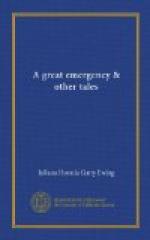“Come along,” said Rupert. “You know I’m very much obliged to you for the net; it’s a splendid one.”
“I’ll bring a camp-stool if there’s not room on the bench,” said Henrietta cheerfully.
“People never take camp-stools to lectures,” said Rupert, and when we got to the cucumber frame we found that the old plank, which he had raised on inverted flower-pots, would have held a much larger audience than he had invited. Opposite to it was a rhubarb-pot, with the round top of a barrel resting on it. On this stood a glass of water. A delightful idea thrilled through me, suggested by an imperfect remembrance of a lecture on chemistry which I had attended.
“Will there be experiments?” I whispered.
“I think not,” Henrietta replied. “There are glasses of water at the missionary meetings, and there are no experiments.”
Meanwhile Rupert had been turning over the leaves of the yellow leather book. To say the truth, I think he was rather nervous; but if we have a virtue among us it is that of courage; and after dropping the book twice, and drinking all the water at a draught, he found his place, and began.
“How to act in an emergency.”
“What’s an emergency?” I asked. I was very proud of being taught by Rupert, and anxious to understand everything as we went along.
“You shouldn’t interrupt,” said Rupert, frowning. I am inclined now to think that he could not answer my question off-hand; for though he looked cross then, after referring to the book he answered me: “It’s a fire, or drowning, or an apoplectic fit, or anything of that sort.” After which explanation, he hurried on. If what he said next came out of his own head, or whether he had learned it by heart, I never knew.
“There is no stronger sign of good-breeding than presence of mind in an—”
“—apoplectic fit,” I suggested. I was giving the keenest attention, and Rupert had hesitated, the wind having blown over a leaf too many of the yellow leather book.
“An emergency,” he shouted, when he had found his place. “Now we’ll have one each time. The one for to-day is—How to act in a case of drowning.”
To speak the strict truth, I would rather not have thought about drowning. I had my own private horror over a neighbouring mill-dam, and I had once been very much frightened by a spring-tide at the sea; but cowardice is not an indulgence for one of my race, so I screwed up my lips and pricked my ears to learn my duty in the unpleasant emergency of drowning.
“It doesn’t mean being drowned yourself,” Rupert continued, “but what to do when another person has been drowned.”
The emergency was undoubtedly easier, and I gave a cheerful attention as Rupert began to question us.
“Supposing a man had been drowned in the canal, and was brought ashore, and you were the only people there, what would you do with him?”




